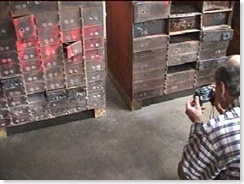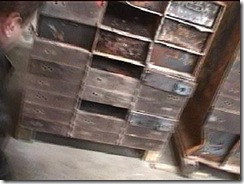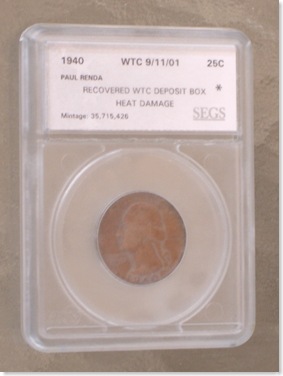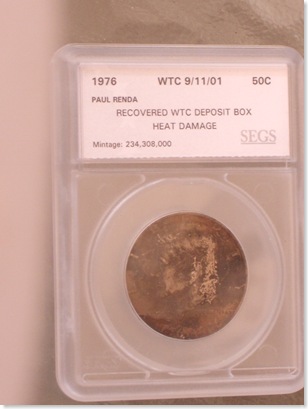Pictures From Ground Zero Vault
- April 25th, 2008
- Posted in Paul Renda WTC Coins, Research Comex Vault
These pictures where provided by Paul Renda, his coins where in the vault under the world trade center around 250 coins where in his box when he open it up. This is his word about the coins from his Chase Manhattan Bank deposit box "They were in the main zone of destruction and were subjected to 1500 degrees for 7 -10 days. My coins went from MS65+ to VF in the time it took to dig them out . ( when bad things happen to good coins). Paul Renda stated that his coins where at the chase Manhattan bank next to the world trade center and in the main debris of the world trade center. Look for the Paul Renda coin story here in a few days.
A Numismatic Catastrophe
- April 4th, 2008
- Posted in Paul Renda WTC Coins, Research Comex Vault
By Ron Guth
Published in Rare Coin Market Report November 2007 www.pcgs.com
This is a true story from 9/11-- one with a numismatic angle. What you are about to read pales in comparison to the loss of human life on that fateful day, but this is a story that needs to be told.
Imagine this nightmare scenario: your bank, where your coins are stored in a safe deposit box, calls to tell you that the bank building collapsed and all that's left is a pile of burning rubble. Plus, it will be month before you can recover anything from your box, assuming the box can be found. That's exactly what happened to collector Paul Renda. You see, Paul's coins were inside a box...inside a vault... inside a New York branch of JP Morgan Chase...inside a skyscraper....which was one of the twin towers known as the World Trade Center On September 11, 2001, terrorists flew planes into each of the towers, causing them to burn and collapse, taking with them nearly 3000 lives and destroying billion of dollars worth of property-- including Paul's coins.
Rescue operations began immediately but were hampered by smoldering fires, poor aor quality and fears of additional collapses due to the unstable structure of the immense pile of rubble. When it became apparent that there were no more survivors, the effort became a recovery and cleanup operation. Demolition crew picked apart the twisted steel and crushed concrete, searching for human remains, recovering lost property and moving away big and small pieces of the towers that once dominated the Manhattan skyline.
Deep beneath the rubble and remains lay a vast assortment of treasures ranging from $230 million in precious metals to entire bank vaults and safe deposit boxes like the one rented by Paul Renda. Eventually, these treasures were recovered and restored to their rightful owners, when such identification was possible. Moths after the collapse, Paul Renda was summoned to a special location to reclaim his treasure. According to the final appraisal report, "The Renda collection of coins is comprised primarily of coins pulled from circulation and a small group of choice un-circulated silver dollars." The inventory list included a variety of coins including Lincoln cents, Shield Nickels, Walking Liberty half dollars, nine silver dollars (six of which were Morgan dollars), and others. In all Paul's box contained 243 coins. Everyone, especially Paul, was anxious to see if his coins had survived and, if they had, what kind of condition they were in. Mr Renda provided PCGS with a videotape of the day he went to recover the contents of his safe deposit box. Watching the video is powerful, as one sees a scene that must have been repeated hundreds, if not thousands of times, by other people claiming the contents of their boxes. The video begins with Paul entering a storage room in which stacks of safe deposit boxes have been placed around the perimeter. The boxes look terrible; they appear burnt, crushed, and many of the doors have already been drilled out or popped open. The fronts have been spray-painted in graffiti-like fashion as a mean of identifying the bank or location in which they were found. Paul is seen scanning each of the stacks, searching for his box (#Z-433), which he finally finds at the lower left corner of one of the burnt-out stacks. The door to Paul's box appears to be in remarkably good shape, better than many of the others, and he attempts to insert his key, to no avail. A technician uses a hammer to punch out the locks and pry open the door. The technician pulls Paul's box out of its drawer and carries it to a makeshift cubicle where the box and its contents can be examined. Paul is given a pair of latex gloves to protect his hands from the soot. The box is charred on the outside but appears to be in good shape, so Paul is hopeful that the contents might have survived. Paul gently opens the lid and peers inside. Paul's hope turns to dismay as the box reveals nothing but the blackened remains of album pages, documents and coins. The temperatures required to melt coins inside a steel box must have been immense. The paper pages of the albums remained intact and appeared to have been turned into charcoal more so than having being burnt. Paul can be seen lifting blackened,individual coins out of the box and laying them onto a sheet of black plastic. As he lift out the individual album pages, coins can be seen dropping from the holes. The pages themselves are very fragile and prone to crumbling. Soon Paul has before him a pitiful pile of burnt album pages and blackened coins. The back of Paul's box contains important documents. Surprisingly most of the documents remain relatively intact as single fragile pages. Paul is able to separate them and, if they don't crumble apart, he can actually read some of them.
Three of Paul's coins are illustrated with this video. Each coin shows severe discoloration and blistering of the surfaces. The melting point of silver is 1,763 degrees Fahrenheit, giving some idea of the inferno these coins endured.
The contents of Paul's box were a disaster. The heat, fire, and corrosive action of the World Trade Center's destruction reduced the value of Paul's collection to that of the bullion value of the silver coins. Likewise, his documents were effectively unsalvageable.
It may come as a surprise to most people, but banks usually have no liability of any kind for the contents of the safe deposit boxes in their care. However, because of the extraordinary circumstances of September 11, JP Morgan Chase offered to compensate Paul for his loss. They hired an outside appraiser to examine the contents of the box and to determine a replacement value for the coins. Surprisingly, the final settlement amount offered by JP Morgan Chase was higher than the hypothetical loss developed by the appraiser. However, Paul decided not to accept the settlement, opting instead to retain all 243 of his coins as memories of this historic event. He plans to donate some of the coins to museums but the bulk of the coins will remain with his family.
Paul Renda's association with the World Trade Center goes beyond this story. Paul was working in the offices of Dean Witter Discover in Two World Trade Center when it was bombed in 1993. He experienced the terror of huddling in a room filling with smoke, not knowing whether to stay put or attempt to make it down to the street. He chose the latter. Paul's cousin Thomas "Tommy" Farino died on 9/11 while responding to the attack. Tommy was a New York Fire Department Captain ( the youngest named Captain of Engine Co. 26) and was promoted posthumously to Battalion Chief.




